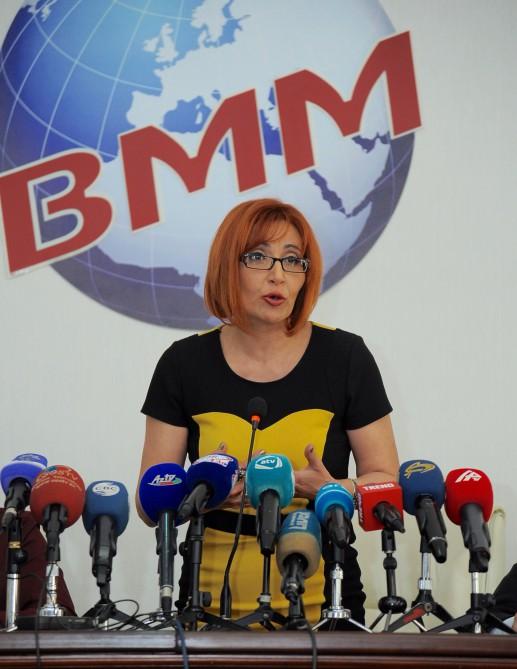Human rights activists: Change of power in Armenia can speed up Nagorno-Karabakh conflict settlement

By Rashid Shirinov
The Armenian leadership hampers the solution of Armenian-Azerbaijani Nagorno-Karabakh conflict, Armenian journalist and social activist Susan Jaghinyan, said at a press conference in Baku on November 9.
She, together with two other Armenian human rights activists, joined the Baku conference on Armenian-Azerbaijani Nagorno-Karabakh conflict: main obstacles and prospects for conflict settlement. The look from Armenia and Azerbaijan" to have an exchnage of opinion over the conflict in a bid to contribute to its settlement.
“The Armenian people had their share of grief. Only occupiers [Armenian authorities] benefited from the conflict,” Jaghinyan stressed.
She underlined that the Nagorno-Karabakh conflict should be resolved, saying that both Azerbaijan and Armenia suffer from the conflict.
“The purpose of my visit to Baku is to contribute to the conflict settlement,” the journalist said. “If the perpetrators of the conflict and those who are currently in power in Armenia remain unpunished, there will be no nation as Armenia after 20 years."
Jaghinyan also emphasized that the Armenian government is inadequate. “My visit to Baku is a slap in the face for the Armenian leadership,” she said, by calling Armenian President Serzh Sargsyan "occupier", who came to power through murders. “President Sargsyan robs his people.”
The journalist added that after her publications appeared in the Azerbaijani media, President Sargsyan instructed the Armenian officials to declare the journalist "dead". “The only way for the Armenian leadership to solve the problem with such people like me is assasination,” she said.
Vahe Avetyan, Armenian human rights activist, also attended the press conference. “Armenia cannot always ignore international law,” he said. “It must respect the territorial integrity of Azerbaijan.”
The activist added that the fundamental basis was created for the work on all points: policy, peacekeeping activity and others in the framework of the Baku conference held on November 8.
“The entire situation with the so-called public movement in Armenia, voicing the position of the country’s authorities, is aimed at disrupting the process that we are carrying out with our Azerbaijani colleagues,” Avetyan stressed.
Vahan Martirosyan, Armenian human rights activist, for his part also emphasized that the change of power in Armenia can speed up the settlement of the Armenian-Azerbaijani conflict. However, he said that Armenia's current authorities will never resign without a coup.
Martirosyan added that issuing Nagorno-Karabakh with an autonomy status is a reasonable decision. “Nobody is going to evict Armenians from there,” he said. “Two peoples will be able to coexist peacefully there.”
The activist also stressed that it is necessary to wirthdraw troops from seven districts around Nagorno-Karabakh and return them back to Azerbaijan.
Martirosyan said that he together with Jaghinyan and Avetyan visited one Armenian family in Baku without journalists, and the members of that family said that they have no problems of living in Azerbaijan. “Armenian names and surnames are indicated in their documents. Unfortunately, such a case is not observed in Armenia,” he regretted.
The conflict between the two South Caucasus countries began in 1988 when Armenia made territorial claims against Azerbaijan. As a result of the ensuing war, in 1992 Armenian armed forces occupied 20 percent of Azerbaijan, including the Nagorno-Karabakh region and seven surrounding districts. More than 20,000 Azerbaijanis were killed and over 1 million were displaced as a result of the large-scale hostilities. The 1994 ceasefire agreement was followed by peace negotiations.
Armenia still controls fifth part of Azerbaijan's territory and rejects implementing four UN Security Council resolutions on withdrawal of its armed forces from the Nagorno-Karabakh and surrounding districts, as well as ignores the resolutions and decisions of the UN General Assembly, OSCE, Council of Europe, NATO, the European Parliament, Economic Cooperation Organization, Non-Aligned Movement and other international organizations.
---
Rashid Shirinov is AzerNews’ staff journalist, follow him on Twitter: @RashidShirinov
Follow us on Twitter @AzerNewsAz
Here we are to serve you with news right now. It does not cost much, but worth your attention.
Choose to support open, independent, quality journalism and subscribe on a monthly basis.
By subscribing to our online newspaper, you can have full digital access to all news, analysis, and much more.
You can also follow AzerNEWS on Twitter @AzerNewsAz or Facebook @AzerNewsNewspaper
Thank you!
